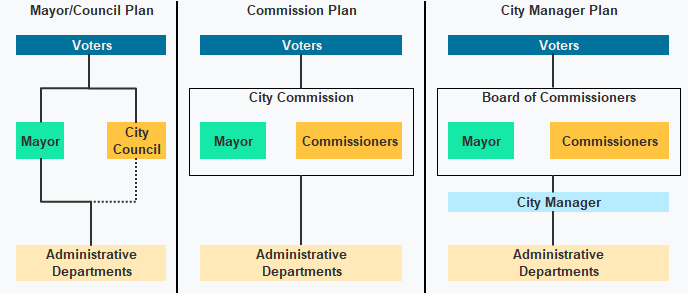Information Central
Form of Government
City governments in Kentucky operate under one of three models: mayor-council, commission or city manager. Although the mayor-council form is the most prevalent, each form has specific advantages for different needs facing cities.
The mayor-council plan operates much like any executive-legislative form of government. The council, as the legislative body, performs legislative duties such as enacting ordinances, levying taxes, and adopting a budget. The mayor holds executive powers such as vetoing legislation, overseeing personnel, and managing the daily affairs of the city. The mayor may also vote to break most ties in council meetings. Around 53% of Kentucky cities use this form, and all have between six and 12 council members.
Cities that have a commission form of government still elect a mayor, but the mayor serves, participates, and votes as a member of the city commission. Each city under a commission form of government elects four commissioners (instead of council members) and one mayor, all of whom constitute the city commission. The commission collectively holds both executive and legislative authority. Around 42% of cities operate under the commission model.
The city manager form of government largely resembles the commission plan because the city elects four commissioners and a mayor to serve on the board of commissioners. The board of commissioners appoints a city manager who acts as the chief administrative officer for the city. This individual is a professional employed by the city to run the government's operational affairs on a day-to-day basis. While only about 5% of Kentucjy cities use a city manager plan, over half of the previous second and third class cities are governed by it.
Louisville operates under a unique consolidated local government plan, and Lexington operates under an urban county government form. Although each plan is different, they both closely resemble a mayor-council form of government. Charter county and unified local government plans are also in state statutes, but no cities and counties have adopted these plans.


